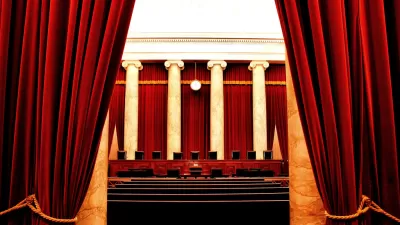The retirement of Supreme Court Justice Anthony Kennedy introduces the possibility that a future court will overturn the doctrine of disparate impact central to fair housing practices and policies.

"Justice Anthony Kennedy wrote the most important decision on fair housing in a generation," writes Kriston Capps, referring to the 5-4 decision in Texas Department of Housing and Community Affairs v. The Inclusive Communities Project that established the disparate impact doctrine and "confirmed that the Fair Housing Act of 1968 bans both explicit discrimination and implicit discrimination."
By deciding to retire, Justice Kennedy has also introduced the possibility that disparate impact will be struck down by the court in the relatively near-term future. The Trump Administration, led by President Trump and Department of Housing and Urban Development Secretary Ben Carson, are already working to undermine fair housing policies and programs.
Three years after that landmark decision, after the election of Trump, HUD is taking steps to undermine the rule at the core of Kennedy’s decision in Inclusive Communities. The department’s announcement that it will reopen its disparate-impact rule comes at a time when HUD faces a rash of lawsuits for failing to enforce another civil-rights standard, the Affirmatively Furthering Fair Housing rule. (The department has declined to discuss these cases.)
Capps lists more examples of the Trump Administration "back-pedaling on fair housing law" in the article, but all of these actions set the stage for a legal showdown that could force the Kennedy-less Supreme Court to decide, again, on disparate impact.
If Carson decides to soften or scrap the disparate-impact rule, legal challenges will almost certainly follow. Other cases may offer the Supreme Court the opportunity to revisit the issue. If and when that happens, it might very well be to strike down the disparate-impact reading. Kennedy’s retirement opens the way for a Trump-appointed justice likely to join the court’s conservatives in arguing that the Fair Housing Act bars explicit racial discrimination only—opening up a world of discriminatory practices in lending, zoning, selling, and renting.
FULL STORY: What Justice Kennedy’s Retirement Could Mean for Fair Housing

Alabama: Trump Terminates Settlements for Black Communities Harmed By Raw Sewage
Trump deemed the landmark civil rights agreement “illegal DEI and environmental justice policy.”

Study: Maui’s Plan to Convert Vacation Rentals to Long-Term Housing Could Cause Nearly $1 Billion Economic Loss
The plan would reduce visitor accommodation by 25% resulting in 1,900 jobs lost.

Why Should We Subsidize Public Transportation?
Many public transit agencies face financial stress due to rising costs, declining fare revenue, and declining subsidies. Transit advocates must provide a strong business case for increasing public transit funding.

Wind Energy on the Rise Despite Federal Policy Reversal
The Trump administration is revoking federal support for renewable energy, but demand for new projects continues unabated.

Passengers Flock to Caltrain After Electrification
The new electric trains are running faster and more reliably, leading to strong ridership growth on the Bay Area rail system.

Texas Churches Rally Behind ‘Yes in God’s Back Yard’ Legislation
Religious leaders want the state to reduce zoning regulations to streamline leasing church-owned land to housing developers.
Urban Design for Planners 1: Software Tools
This six-course series explores essential urban design concepts using open source software and equips planners with the tools they need to participate fully in the urban design process.
Planning for Universal Design
Learn the tools for implementing Universal Design in planning regulations.
Caltrans
Smith Gee Studio
Institute for Housing and Urban Development Studies (IHS)
City of Grandview
Harvard GSD Executive Education
Toledo-Lucas County Plan Commissions
Salt Lake City
NYU Wagner Graduate School of Public Service





























